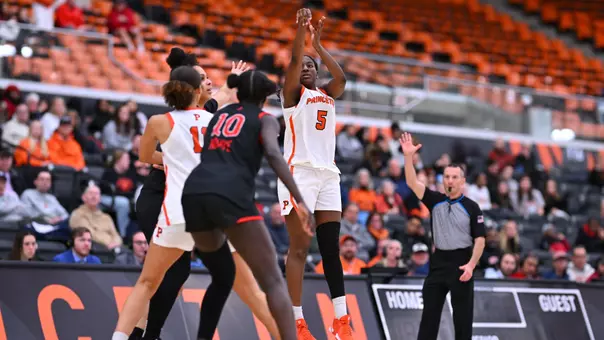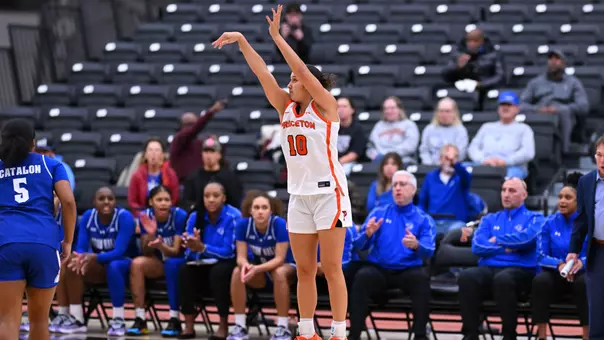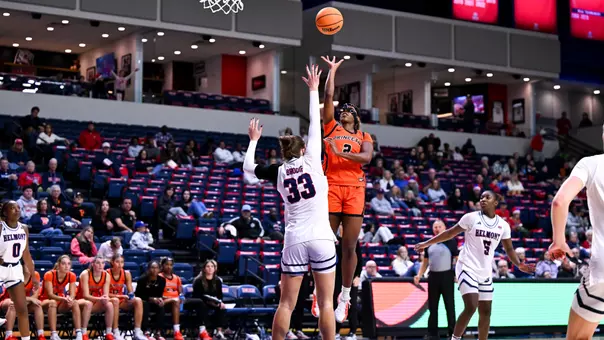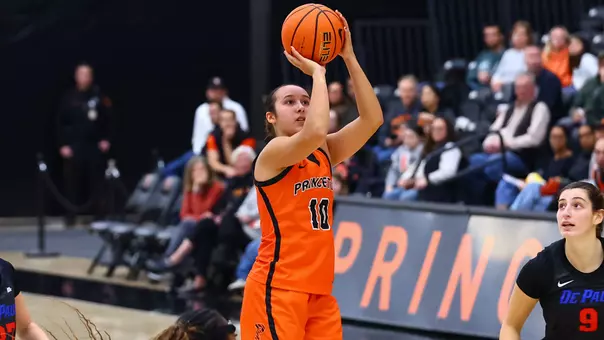Princeton University Athletics
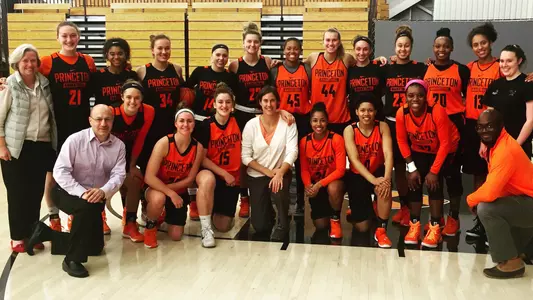
Shirley Tilghman, Howard Stone, Kristen Starkowski, Sabine Petry, Bryant Blount with 2015-16 women's basketball team.
Courtney Banghart's 10 on 10: Academic-Athletic Fellows
September 07, 2017 | Women's Basketball
PRINCETON, N.J. - Recently finishing her 10th season, Princeton head coach Courtney Banghart sits with 208 career victories, 113 of which have come in the Ivy League. She is fourth all-time in the Ivy League in career and conference wins.
Banghart's 10 on 10: The Coaching Staff
Banghart's 10 on 10: The Class of 2013
Banghart's 10 on 10: The Alumni Weekend
Banghart's 10 on 10: Addie Micir '11
Banghart's 10 on 10: Overseas Trips
Banghart's 10 on 10: Bella Alarie's Freshman Season
Banghart's 10 on 10: Tani Brown '10 and Cheryl Stevens '10
To celebrate her 10 years at Princeton, the Ivy's all-time leader in overall winning percentage and conference winning percentage, laid out her 10 favorite memories. In this article, Banghart's memories will continue with a look on the team that doesn't record any statistics on the court … Academic-Athletic Fellows.
Being a student-athlete is a certainly difficult project to take on, but at Princeton, players have a plethora of resources that can be used to help manage. One of those resources are the Academic-Athletic Fellows for each team.
The Academic-Athletic Fellows are a group of faculty and staff who are committed to strengthening and advancing the student-athlete ideal while reinforcing the educational mission of the university. Although collectively serving as a student-athlete support group, individual fellows form an affiliation with a specific team and coach. Their mission is to strengthen and reinforce the ties between a student's academic and athletic pursuits and act as a resource for the student-athletes, coaches, academic administrators and faculty.
Getting to know an extraordinary group of young women is the biggest benefit as a fellow," said Karen Jezierny, Director of Public Affairs at Princeton. "The Fellows program provides student-athletes with another diverse group of campus-based people who can support them. Fellows can respond to the needs of individual student athletes – with advice, insight, ideas, support, and friendship.
As a former student athlete at Princeton, Bryant Blount '08 understands what the rigors of balancing athletics and academics are like. "The level of academic rigor and competition in the classroom, and the caliber of athlete they face every day at practice can be humbling," mentioned Blount, the Assistant Dean of Undergraduate Students. "It can take a little time and some external support to get there. That can mean anything from getting support from family and friends or relying on old study habits, but I also like to believe that fellows can be a resource, as we have all been in close proximity to this elite academic-athletic experience for many years and can help with the transition."
Being a fellow is also a learning experience for the faculty. Howard Stone, the Donald R. Dixon '69 and Elizabeth W. Dixon Professor Chair for Mechanical and Aerospace Engineering, stated "Perhaps more importantly as a faculty member, this exposure to student-athletes helps me better understand the time pressures faced by our students as they balance their academic work and their extracurricular activities." He went on by saying, "Getting to know the coaches, observing their dedication to the student-athletes, and learning from the coaches about leadership skills and training strategies has been very helpful to me more generally."
Once the student-athletes get to campus, there is a variety of ways that fellows begin their relationships. "I visited some practices and Courtney wisely suggested inviting them to lunch by year," said Stacy Wolf, the Director of the Princeton Arts Fellows and Program in Music Theater at the Lewis Center of the Arts. "I loved meeting all of them, but nothing connects you like having students in class."
Ice cream," said Jezierny. "Princeton has a lot of great ice cream options and I am enthusiastic about helping students find their favorite! Coffee provides another opportunity to explore to get to know the student athletes and help them explore the community. But seriously, finding a way to pull the student-athletes out of their dual roles of "student" and "athlete" in order to get to know them is an important first step. Getting a little bit off campus, or sharing one of my favorite spots on campus, can break the ice and help us get to know each other."
After the student-athletes establish a rapport with the fellows, the fellows can be utilized in multiple ways. "My instinct is always to push student-athletes to explore their interests outside of the sport, and build their network well beyond their team (or even other athletes)," discussed Blount. "I work in the Office of the Dean of Undergraduate Students, and one of our core missions is to create sites of engagement for a broad range of students. If student-athletes are comfortable engaging with others from different backgrounds to achieve common goals, I think they'll be more likely to push themselves in their academic work, to collaborate effectively in their academic work, and to translate their athletic focus and discipline into the 'life of the mind'."
"When I see them and meet with them, I offer my help in reviewing any resources they need, or just lend an ear to discuss their challenges," stated Kathleen Mannheimer, Senior Career Adviser in the Office of Career Services. "I try to inform them of deadlines pertaining to internships, or their job search, so that they are given advance notice of options they might be considering."
In the end, the bonds created through the fellow program for both the student-athletes and faculty are beneficial for everyone.
"I enjoy the relationships that I have developed with the players and the opportunity to be part of the team as a community," declared Kristen Starkowski, a doctoral candidate in the English program. "The student-athlete experience is rewarding in large part due to its rigor--with great challenges come greater rewards--and I am glad to be able to help these athletes get the most out of their time at Princeton by supporting them on the court and in the classroom."
Wolf conferred, "For me, it's so valuable to be a small part of a different world at Princeton and even better to have the women be in my world, too."
"I am always energized by traveling with the team and I am always, always proud of how they represent themselves, the women's basketball team, and Princeton University when they are on the road," exclaimed Jezierny.
"Meeting with them (student-athletes) and their families, and helping them understand the full Princeton experience has been an important way in which I can contribute to the team's efforts to bring to their team the best athletes and those that are the right fit for the University and the team," said Mannheimer.
"Helping students maximize their opportunities to compete at the Division-I level while also leveraging the Princeton education, environment, and network is extremely rewarding," acknowledged Blount.
Banghart summed up the meaning of what the fellows mean to her team by expressing, "Our faculty fellows are truly an integral part of the fabric of this program." She continued with "They are supporters of, cheerleaders for, and mentors in the growth and experience for all of our student-athletes past, present, and future. They embody passion and compassion, and they are the perfect blend of various touch points on this campus and beyond. I consider them teammates and friends and I'm so grateful daily for their commitment to our program. We are better with them, without a doubt."
Banghart's 10 on 10: The Coaching Staff
Banghart's 10 on 10: The Class of 2013
Banghart's 10 on 10: The Alumni Weekend
Banghart's 10 on 10: Addie Micir '11
Banghart's 10 on 10: Overseas Trips
Banghart's 10 on 10: Bella Alarie's Freshman Season
Banghart's 10 on 10: Tani Brown '10 and Cheryl Stevens '10
To celebrate her 10 years at Princeton, the Ivy's all-time leader in overall winning percentage and conference winning percentage, laid out her 10 favorite memories. In this article, Banghart's memories will continue with a look on the team that doesn't record any statistics on the court … Academic-Athletic Fellows.
Being a student-athlete is a certainly difficult project to take on, but at Princeton, players have a plethora of resources that can be used to help manage. One of those resources are the Academic-Athletic Fellows for each team.
The Academic-Athletic Fellows are a group of faculty and staff who are committed to strengthening and advancing the student-athlete ideal while reinforcing the educational mission of the university. Although collectively serving as a student-athlete support group, individual fellows form an affiliation with a specific team and coach. Their mission is to strengthen and reinforce the ties between a student's academic and athletic pursuits and act as a resource for the student-athletes, coaches, academic administrators and faculty.
Getting to know an extraordinary group of young women is the biggest benefit as a fellow," said Karen Jezierny, Director of Public Affairs at Princeton. "The Fellows program provides student-athletes with another diverse group of campus-based people who can support them. Fellows can respond to the needs of individual student athletes – with advice, insight, ideas, support, and friendship.
As a former student athlete at Princeton, Bryant Blount '08 understands what the rigors of balancing athletics and academics are like. "The level of academic rigor and competition in the classroom, and the caliber of athlete they face every day at practice can be humbling," mentioned Blount, the Assistant Dean of Undergraduate Students. "It can take a little time and some external support to get there. That can mean anything from getting support from family and friends or relying on old study habits, but I also like to believe that fellows can be a resource, as we have all been in close proximity to this elite academic-athletic experience for many years and can help with the transition."
Being a fellow is also a learning experience for the faculty. Howard Stone, the Donald R. Dixon '69 and Elizabeth W. Dixon Professor Chair for Mechanical and Aerospace Engineering, stated "Perhaps more importantly as a faculty member, this exposure to student-athletes helps me better understand the time pressures faced by our students as they balance their academic work and their extracurricular activities." He went on by saying, "Getting to know the coaches, observing their dedication to the student-athletes, and learning from the coaches about leadership skills and training strategies has been very helpful to me more generally."
Once the student-athletes get to campus, there is a variety of ways that fellows begin their relationships. "I visited some practices and Courtney wisely suggested inviting them to lunch by year," said Stacy Wolf, the Director of the Princeton Arts Fellows and Program in Music Theater at the Lewis Center of the Arts. "I loved meeting all of them, but nothing connects you like having students in class."
Ice cream," said Jezierny. "Princeton has a lot of great ice cream options and I am enthusiastic about helping students find their favorite! Coffee provides another opportunity to explore to get to know the student athletes and help them explore the community. But seriously, finding a way to pull the student-athletes out of their dual roles of "student" and "athlete" in order to get to know them is an important first step. Getting a little bit off campus, or sharing one of my favorite spots on campus, can break the ice and help us get to know each other."
After the student-athletes establish a rapport with the fellows, the fellows can be utilized in multiple ways. "My instinct is always to push student-athletes to explore their interests outside of the sport, and build their network well beyond their team (or even other athletes)," discussed Blount. "I work in the Office of the Dean of Undergraduate Students, and one of our core missions is to create sites of engagement for a broad range of students. If student-athletes are comfortable engaging with others from different backgrounds to achieve common goals, I think they'll be more likely to push themselves in their academic work, to collaborate effectively in their academic work, and to translate their athletic focus and discipline into the 'life of the mind'."
"When I see them and meet with them, I offer my help in reviewing any resources they need, or just lend an ear to discuss their challenges," stated Kathleen Mannheimer, Senior Career Adviser in the Office of Career Services. "I try to inform them of deadlines pertaining to internships, or their job search, so that they are given advance notice of options they might be considering."
In the end, the bonds created through the fellow program for both the student-athletes and faculty are beneficial for everyone.
"I enjoy the relationships that I have developed with the players and the opportunity to be part of the team as a community," declared Kristen Starkowski, a doctoral candidate in the English program. "The student-athlete experience is rewarding in large part due to its rigor--with great challenges come greater rewards--and I am glad to be able to help these athletes get the most out of their time at Princeton by supporting them on the court and in the classroom."
Wolf conferred, "For me, it's so valuable to be a small part of a different world at Princeton and even better to have the women be in my world, too."
"I am always energized by traveling with the team and I am always, always proud of how they represent themselves, the women's basketball team, and Princeton University when they are on the road," exclaimed Jezierny.
"Meeting with them (student-athletes) and their families, and helping them understand the full Princeton experience has been an important way in which I can contribute to the team's efforts to bring to their team the best athletes and those that are the right fit for the University and the team," said Mannheimer.
"Helping students maximize their opportunities to compete at the Division-I level while also leveraging the Princeton education, environment, and network is extremely rewarding," acknowledged Blount.
Banghart summed up the meaning of what the fellows mean to her team by expressing, "Our faculty fellows are truly an integral part of the fabric of this program." She continued with "They are supporters of, cheerleaders for, and mentors in the growth and experience for all of our student-athletes past, present, and future. They embody passion and compassion, and they are the perfect blend of various touch points on this campus and beyond. I consider them teammates and friends and I'm so grateful daily for their commitment to our program. We are better with them, without a doubt."
The Get Stops Podcast - Dec. 9, 2025
Tuesday, December 09
The Get Stops Podcast - Nov. 5, 2025
Wednesday, November 05
The Get Stops Podcast - March 12, 2025
Thursday, March 13
The Get Stops Podcast - Feb. 27, 2025
Thursday, February 27





.png&width=24&type=webp)





